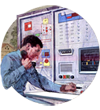What is An Community Portal?
Categories:
Community portals are now emerging as a new industry in cyberspace as Internet access spreads throughout the country. Their growth is likely to increase significantly over the next few years. The Community Network movement of the early 1990's failed in large part because there was no source of ongoing financial support. Now that businesses at every level are using the Internet as a marketing tool, it becomes possible to build a community portal around local advertising. LongBeachOnline.net which won GoldenWeb awards in 2003 and 2004 describes itself as Long Beach’s retail business portal and charges $850 a year for banner ads on the site. Just as advertising has been key to the success of local newspapers, so it will be for community portals.
Yet if there is a weakness in many of these emerging portals, it lies in the area of democracy. It is reasonable to expect a strong community portal to include at least one well-organized page that citizens could use to gain easy access to the web resources that they need. Such a page would include the following:
- Links to all levels of government - Just about every township, city, county, and state government in the United States now has a web site. A strong community portal should make it easy to find the ones you need.
- Access to elected officials - Most local and state officials now have web sites, along with every member of Congress. It would be especially useful to use the Vote-Smart profiles of Representatives and Senators since these include voting records, interest group rates, recent public statements, along with fast access to the representative's web site.
- Access to public agencies and community organizations organized by areas of civic concern - These would include housing and code enforcement, public safety, education and youth development, health social services, and aid to the poor. Here is where linking directly to the City Departments related to specific concerns becomes especially helpful. There's a well organized Community and Neighborhood page on the City of Chicago site, as an example, but it's buried in the site. A good civic engagement portal should link to it directly.
- Access to the School District and organizations related to education - School Districts have their own web sites with a wide range of resources aimed at students, parents, and the general public. There are a wide range of after-school programs, community groups, and advocacy organizations related to kids. They're all over the internet. A civic engagement web site should link to each of them directly.
- Access to information about elections, political parties, and partisan politics - Minnesota's E-Democracy web site created in the early 1990's to expand participation and build stronger democracies and communities is a good model with an email list of more than 5,000 e-citizens and a wide range of discussion forums covering local and national issues. For all the attention now paid to politics online, there aren't many web sites that even come close to Minnesota's E-Democracy.
Long Beach, as an example, provides easy access to local news, restaurants, entertainment, shopping, and resources for children. But when it comes to helping the citizens of Long Beach connect to government, there are only two pages: one where people can volunteer for community services and a page of links to the City of Long Beach web site and election information.
There's a much more civic minded portal in nearby San Diego, SDcommunities.net, that offers wide range of resources to people who want to get involved. This portal features searchable links to municipal, county, state, and federal governments, along with civic groups, public safety agencies and organizations, schools and youth service organizations, and a wide range of social services. In addition to these resources, SDCommunities.net offers resources for shopping, real estate, employment, movies, restaurants, and even bars. But these resources are secondary to the civic mission of the site. And no matter how interesting the global aspect of the Net was, and still is, in most cases it is not as relevant as the 10 square mile radius that we live in. As a result, one of the most useful aspects of the Internet has long been eclipsed - its ability to make you more aware of your own neighborhood and town.
Let's make sure democracy is not lost in the shuffle.










